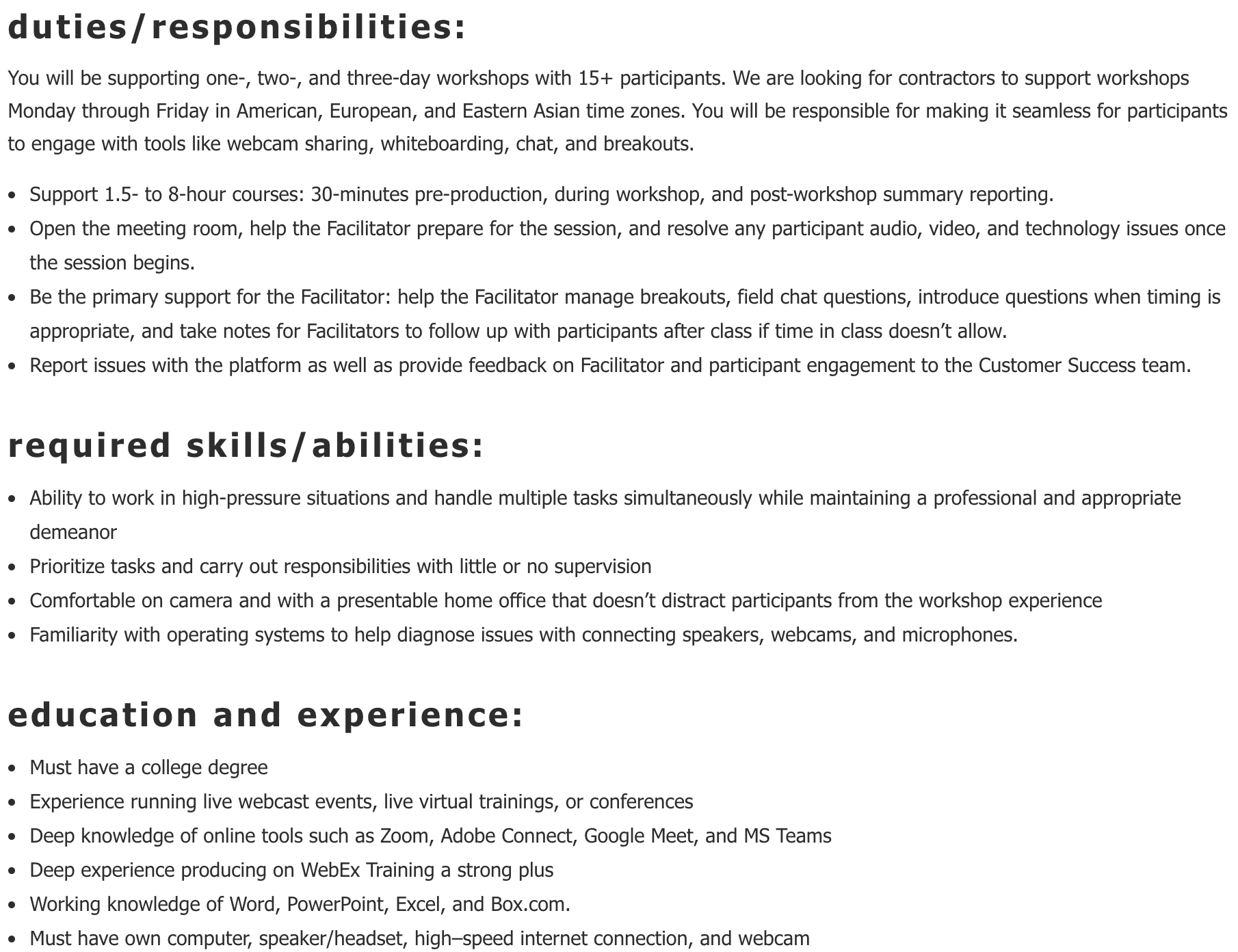
Flexible Jobs for Escaping Reality | brokeGIRLrich
So I’ve been considering how to run away the last few weeks. I’ve done a lot of research on RVs with the idea of solitarily rolling around America and exploring some national parks and outdoor wonders.
I’ve also looked at some countries that are allowing Americans in with really low cost of living with the idea of isolating out on a remote beach somewhere.
I can consider these things thanks to the last 8 years of hardcore personal finance habits, luck, and certainly some a solid dose of privilege. But the fact is that I can consider them, so I am.
I doubled down on the considerations when I got this new job as a freelance digital workshop producer back in October. I was going a little stir crazy at my dad’s and realized that I could essentially work from anywhere that has good WiFi.
I quietly turned this over in my head for a while, and plugged along working to make sure I had a real idea of what my income with this job would be like, and realistically how many hours a week I would be offered work.
While the holidays put a dent in my income (one week with no workshops around Thanksgiving and two weeks around Christmas/New Years), most weeks I work at least 16 hours and sometimes in excess of 30.
Running all those numbers again, low cost country seemed like the best approach.
It occurred to me that there may still be a bunch of arts, entertainment, and events workers who are in the same boat – a bit financially stable, living with parents, slowly going insane.
So I rounded up some flexible jobs to check out that could let you relocate for a while.
Disclaimer: And if you do relocate, do the same smart things you’re doing now – like masks, minimal interaction outside your bubble, and hand sanitizer for days. Also don’t forget to account for 14 days of quarantining on either side of your travels if they’re taking you through somewhere public like an airport too – which may sound crazy but if you get one of these flexible, remote jobs, it’s doable.
I’m putting this at the top of the list because they will hire just about anyone. I would say it is “almost” a guaranteed job, as long as you are a native English speaker from the U.S., U.K. or Australia, and you have a college degree (in anything). You also have to have one year of teaching experience, but they’re very flexible on what that is – substitute teaching, Sunday School, music lessons…
The problem with this job is startup costs. You have to have a TESOL/TEFL/TESL Certificate. You need a USB headset. You need a red polo shirt. You need to put the logo in the background whenever you’re teaching. You need to plug your ethernet cable directly into your modem.
For me, this meant I had to get the certificate ($39.99 – iTutor has a discount deal with a company where you can do the course online. You get access to the discount if you apply at iTutor. It’s also 120 hour course, so it was a large time investment), a red polo shirt ($9.99), a USB Headset ($34.99), and an adapter so I could plug an ethernet cord into my Macbook ($29.00).
You may have these items already, so no issues then, but $113.97 is nothing to sneeze at. That’s about 15 hours of work after taxes.
They also require you to do 2 hours of unpaid training.
I think these things are garbage but if you make it through those hurdles, you’ll get quite a few hours of work a week.
There are many iTutor teachers who travel for a living and those are the main people who report back happily about the company. It’s not a great place to work but also not terrible and folks report making enough to fund their transient lifestyles.
Also, don’t confuse this job with iTutor.com, which is an American based tutoring group that required you to have an American teaching certificate.
Another bonus for iTutor is that it’s a decent survival job overall for those working in the arts, even when things get back to normal.
Digital Event Producing
For those coming at this from management backgrounds or board ops, there are a lot of jobs right now for people who can run Zoom/WebEx/MS Teams/Etc. for corporate events. The main problem with finding these jobs is that they’re called lots of different things.
That’s essentially what I do right now, and at my company it’s called Digital Workshop Producer. However, some other companies hiring Digital Event/Workshop Producers are looking for people to produce the whole event (which I think is very much a skill stage and production managers have), so make sure to read the description carefully.
Phrases to look for:
- Zoom Producer
- Zoom Technician
- Virtual Technical Director
- Virtual Technician
- Virtual Producer
- Virtual Event Coordinator
You can also sub Digital for Virtual in all those options too.
The main place I looked for these jobs was on LinkedIn. I also Googled “digital conferences” and would sort through the results to try to find the companies producing them. Then I would check their websites for a Careers/Jobs tab. As I mentioned above, they get really creative with what they call this job sometimes, but if you’re scrolling through their openings, you’ll usually see a phrase that makes you think to look at the job duties. An example of one of these job listings is below:

It seems silly to pay someone to literally just operate Zoom, but the very large companies especially seem to just not be interested in learning how to do this and also have money to burn. A meeting full of C-Suite executives don’t want to spend their time trying to troubleshoot with one participant why their audio isn’t working, so they get on with their meeting and you do that troubleshooting with the person having the problem.
Virtual Assistant
Since well before the plague, virtual assistants were keeping businesses running all over the globe.
Virtual assistants work from anywhere – sometimes with set hours, sometimes more task based. They do a myriad of things that traditionally have fallen into an assistant position, but you negotiate them with your boss when you’re hired.
After years of blogging, I’ve noticed that there are a few paths that folks who start blogs seem to take – some focus solely on their blog and bring in some income from that, many add freelance writing to the mix, and quite a few become virtual assistants. I think that’s because in learning how to run your own blog, you network with a bunch of people and those who double down on focusing solely on their blog, if they’re successful, usually wind up needing assistants.
There are some folks who make their entire living doing this. Kayla Sloan (an actual human I have met multiple times), was one of the earlier and most successful VAs in the blogging-sphere. She created a course for those interested in becoming a VA, which you can find here.
Disclaimer, it’s pricey. It comes in just under $500. But I have heard nothing but rave reviews and it really does seem like everyone who puts in the effort actually does land jobs and manage to make the living their looking for from it.
On the totally free side of things, you can google Virtual Assistant jobs and just start applying.
Miscellaneous Jobs
There are also job boards you can join for a small fee that pull together all remote, work from home options in one place.
So rather than looking for a category of jobs that are always remote, these boards may have jobs that cater to your skill set that just happen to be remote. And if you can get a job that uses your main skill set, you’re likely to make a lot more money.
One spot to look for jobs like these is FlexJobs. It’s been around since 2007 and has jobs from pretty much every field.
You can try it for 30 days and if you don’t like it, they’ll give you a refund. And if you have Rakuten installed, there’s an additional $7.50 cashback offer for FlexJobs right now.




Great article! I appreciate the valuable insights and well-presented information. The writing style is engaging and makes the content easy to absorb. It’s evident that a lot of thought went into creating this piece. Looking forward to reading more from you. Keep up the excellent work!